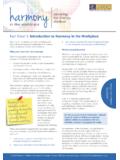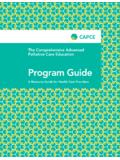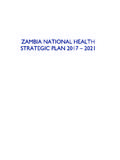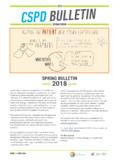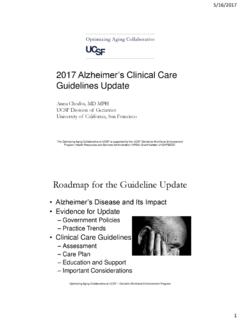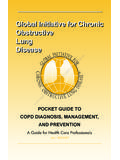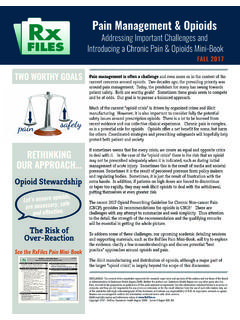Transcription of FOR PEOPLE FROM CULTURALLY AND LINGUISTICALLY …
1 national AGEING AND AGED care strategy FOR PEOPLE FROM CULTURALLY AND LINGUISTICALLY DIVERSE (CALD) BACKGROUNDSN ational Ageing and Aged care strategy for PEOPLE from CULTURALLY and LINGUISTICALLY Diverse (CALD) BackgroundsISBN: 978-1-74241-859-9 Online ISBN: 978-1-74241-860-5 Publications approval number: D0982 Commonwealth of Australia 2012 This work is copyright. You may reproduce the whole or part of this work in unaltered form for your own personal use or, if you are part of an organisation, for internal use within your organisation, but only if you or your organisation do not use the reproduction for any commercial purpose and retain this copyright notice and all disclaimer notices as part of that reproduction. Apart from rights to use as permitted by the Copyright Act 1968 or allowed by this copyright notice, all other rights are reserved and you are not allowed to reproduce the whole or any part of this work in any way (electronic or otherwise) without first being given the specific written permission from the Commonwealth to do so.
2 Requests and inquiries concerning reproduction and rights are to be sent to the Online, Services and External Relations Branch, Department of Health and Ageing, GPO Box 9848, Canberra ACT 2601, or via e-mail to 1 CONTENTSM inisterial Foreword 3 Diverse Australia 4 Current approaches to catering for cultural and linguistic diversity 6 CULTURALLY and LINGUISTICALLY appropriate care 7 Annual Reporting 8 Principles 8 Strategic Goals and Actions 12 GOAL 1 CALD input positively affects the development of ageing and aged care policies and programs that are appropriate and responsive 12 GOAL 2 Achieve a level of knowledge, systems capacity and confidence for older PEOPLE from CALD backgrounds.
3 Their families and carers to exercise informed choice in aged care 13 GOAL 3 Older PEOPLE from CALD backgrounds are able and have the confidence to access and use the full range of ageing and aged care services 14 GOAL 4 Monitor and evaluate the delivery of ageing and aged care services to ensure that they meet the care needs of older PEOPLE from CALD backgrounds, their families and carers 15 GOAL 5 Enhance the CALD sector s capacity to provide ageing and aged care services 16 GOAL 6 Achieve better practice through improving research and data collection mechanisms that are inclusive of cultural and linguistic diversity in the ageing population 17 Appendices 18 Acronyms and Terms 18 Relevant Policy and Legislative Frameworks 20 Further Reading 212 national AGEING AND AGED care strategy FOR PEOPLE FROM CULTURALLY AND LINGUISTICALLY DIVERSE (CALD) BACKGROUNDS3 national AGEING AND AGED care strategy FOR PEOPLE FROM CULTURALLY AND LINGUISTICALLY DIVERSE (CALD)
4 BACKGROUNDSMINISTERIAL FOREWORDI greatly welcome the opportunity to present the Government s new national Ageing and Aged care strategy for PEOPLE from CULTURALLY and LINGUISTICALLY Diverse (CALD) Backgrounds (the strategy ).The Australian Government is committed to ensuring equitable access to high quality, CULTURALLY appropriate aged care for PEOPLE from CALD backgrounds. A range of initiatives have been put in place that recognise: a large proportion of older PEOPLE in Australia were born overseas and the proportion of older PEOPLE from CALD backgrounds is increasing at a faster rate than other older PEOPLE ; changing immigration patterns in Australia will lead to changing consumer cohorts, which will impact on service delivery and require forward planning; and barriers to accessible, CULTURALLY appropriate aged care still exist in Australia.
5 The strategy is designed to inform the way the Australian Government supports the aged care sector to deliver care that is appropriate and sensitive to the needs of older PEOPLE from CALD backgrounds. The strategy will assist the Department of Health and Ageing (DoHA) in implementing the activities outlined in the Living Longer Living Better aged care reform package and assist in guiding future funding is essential for aged care services to support the lives of older PEOPLE from CALD backgrounds, their families and carers to continue to contribute to and engage with their communities. Aged care must accommodate the community life of older PEOPLE from CALD backgrounds, not the other way strategy complements Australia s multicultural policy, The PEOPLE of Australia, released in Federation of Ethnic Communities Councils of Australia is to be commended for their significant contribution to this strategy and I thank them for their time and look forward to the implementation of this strategy and its initiatives which will benefit PEOPLE from CALD backgrounds well into the Butler MP4 national AGEING AND AGED care strategy FOR PEOPLE FROM CULTURALLY AND LINGUISTICALLY DIVERSE (CALD) BACKGROUNDSDIVERSE AUSTRALIAA ustralia is one of the most CULTURALLY diverse nations in the world.
6 PEOPLE from CALD backgrounds are a significant and growing proportion of the Australian population aged over 65. They have made important contributions to the Australian community in helping build the prosperous and CULTURALLY rich country that we live in today. Around 20 per cent of PEOPLE aged over 65 years were born outside Australia which equates to more than 600,000 PEOPLE . By 2021, more than 30 per cent of Australia s older population will have been born outside Australia. While 14 per cent of Australians are aged over 65, this proportion varies significantly among a number of CALD communities due to migration patterns. For example, of those PEOPLE in Australia who were born in Latvia, Lithuania, Estonia or Slovenia, more than 60 per cent are aged 65 years and over. Conversely, of those living in Australia who were born in South Korea, Taiwan or Afghanistan, less than five per cent are aged 65 years and over.
7 It is important to recognise that older Australians from CALD backgrounds are not a uniform group. The diversity within Australia s CALD community is significant. Australians identify with more than 300 ancestries and there are more than 260 different languages spoken in Australia today, including Indigenous 2021, more than 30 per cent of Australia s older population will have been born outside AGEING AND AGED care strategy FOR PEOPLE FROM CULTURALLY AND LINGUISTICALLY DIVERSE (CALD) BACKGROUNDSThe needs of different CALD communities and individuals within those communities vary considerably. These distinct needs must be recognised and catered for in the aged care system to ensure that it has the capacity to respond to the individual person regardless of their cultural or linguistic background . All individuals are cultural beings embedded within the cultural and linguistic paradigms of their families, social groups, community, education and is also important to recognise the valuable role performed by carers in providing care and support for older PEOPLE from CALD backgrounds.
8 CALD carers can experience greater difficulty in accessing and navigating the aged care system - many CALD carers are hidden carers who are more likely to experience barriers related to differences in language and culture. Cultural resistance to formal aged care services in many CALD communities means that many older PEOPLE from CALD backgrounds are themselves a carer for a family member and many CALD carers face cultural and other barriers in accessing carer support individuals are cultural beings embedded within the cultural and linguistic paradigms of their families, social groups, community, education and with any group of PEOPLE , older PEOPLE from CALD backgrounds have multiple diverse characteristics that overlap and alter their specific needs and how they access services. This diversity within diversity includes (but is not limited to) care leavers, being lesbian, gay, bisexual, transgender or intersex, PEOPLE living with dementia, those in palliative care , suffering financial disadvantage and issues associated with living in rural and regional areas.
9 All of the issues discussed in this strategy tend to be exacerbated for diverse groups and this can result in very different experiences which need to be considered when providing aged care services. Also important is the consideration of the needs of older PEOPLE with refugee or refugee-like experiences, as well as veterans from CALD backgrounds which will require the consideration of their mental health in the development and delivery of appropriate aged AGEING AND AGED care strategy FOR PEOPLE FROM CULTURALLY AND LINGUISTICALLY DIVERSE (CALD) BACKGROUNDSC urrent Approaches to Catering for Cultural and Linguistic DiversityThe Aged care Act 1997 and its associated principles define a number of Special Needs groups that are taken into account in planning and delivering aged care services. PEOPLE from non-English speaking backgrounds (CALD backgrounds) are designated as one of these PEOPLE from CALD backgrounds can access and benefit from the same funding and services as other older PEOPLE in the community.
10 There are also some additional initiatives intended to address their Special Australian Government funds an organisation in each state and territory to equip aged care providers to deliver CULTURALLY appropriate care to older PEOPLE from CALD backgrounds. These organisations provide CULTURALLY appropriate training to staff of aged care services, disseminate information on high quality aged care practices and support aged care service providers to develop new CULTURALLY appropriate services including clusters, ethno-specific and multicultural aged care services. Funding is also provided to the organisations to assist older PEOPLE from CALD communities to gain access to aged care information and services. Some of the activities undertaken by the organisations include translations, referrals and information sessions for CALD communities.
